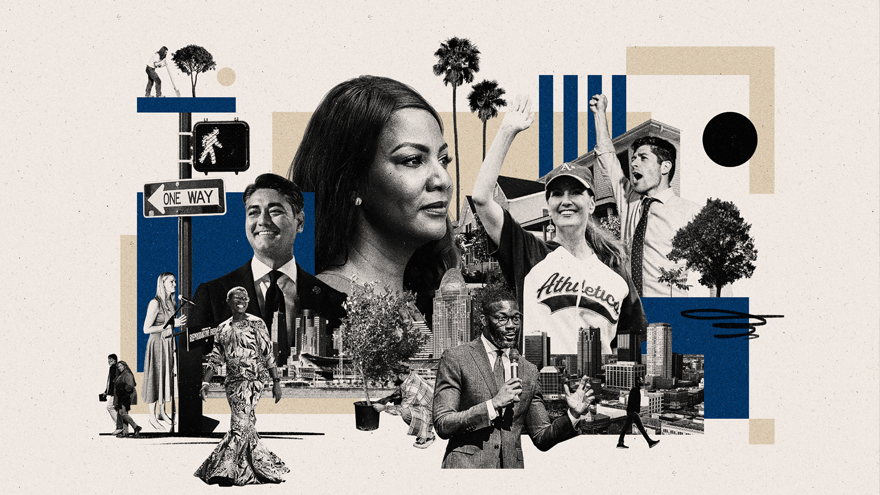I’ve been consorting with a bunch of mayors lately, and I must say I’ve been impressed. Particularly at this time in our history, when local leaders who are working on big issues like climate action and affordable housing are going to be more consequential than ever.
It wasn’t always this way. The first mayor I covered as a young newspaper reporter in Torrington, Connecticut, was indicted on corruption-related perjury charges shortly after I arrived. The chief executive in the next city I moved to, Pittsfield, Massachusetts, championed a long-term contract with a water purification vendor, and then promptly joined the company in a high-paying senior position.
The current generation of municipal leaders is quite a contrast: genuine, honest, creative, and action-oriented. Just a marvelous group of essentially urban planners and policy wonks.
I have drawn these conclusions from interviewing two dozen municipal chief executives over the last eight years for a series called “Mayor’s Desk,” published in Land Lines magazine at the Lincoln Institute of Land Policy—the think tank where I landed after leaving the Boston Globe. Most of those conversations were also recorded for the Land Matters podcast, and the first 20 were compiled in a book, Mayor’s Desk: 20 Conversations with Local Leaders Solving Global Problems, published in partnership with Columbia University Press.
Our remit was to ask these leaders about issues that are central to our work—and that just so happen to be some of the most pressing, on-the-ground issues that voters are concerned with, like housing and climate change and public transportation. Underneath those topics, of course, are the technical details of zoning and land use regulation and infrastructure finance. Catnip for everyone involved.
But it’s the nuts and bolts that make cities work. Paige Cognetti, mayor of Scranton, Pennsylvania, ordered a “walkability audit” to help make downtown more inviting. Minneapolis mayor Jacob Frey oversaw a ban on single-family-only zoning, a move that allowed more density and pushed rents down. Mayor Jesse Arreguín pushed for a vacancy tax in Berkeley to free up more housing and discourage real estate speculation. Phoenix mayor Kate Gallego battled intense heat and water shortages by encouraging rock gardens and native plantings over sterile lawns. Mayor Randall Woodfin established a federal grants command center in Birmingham, Alabama, to make sure every dollar coming from Washington was well spent.
There are leadership lessons here. All that attention to detail tends to produce targeted, near-term wins that pay off in terms of both symbolic value and immediate impact. Cincinnati mayor Aftab Pureval, worried that the city’s recent popularity as a climate haven could intensify gentrification, worked with the Port of Cincinnati to outbid institutional investors for nearly 200 homes now available to income-qualified families. Yvonne Aki-Sawyerr, mayor of Freetown, Sierra Leone, who appointed Africa’s first chief heat officer, collaborated with the Adrienne Arsht-Rockefeller Foundation Resilience Center to install protective shades in open-air markets where women vendors had been subjected to withering heat.
Burlington, Vermont—of course there’s a Vermont angle!—stands out as an example of local action on big issues, whether in establishing one of the nation’s first and most successful community land trusts or in running the municipal electrical utility that will help the city be net zero energy by 2030. My interview was with Miro Weinberger, yet another no-nonsense, just-get-it-done brand of leader.
Reflecting on the experience of interviewing all these mayors brings me backward but also looking to the future. The world keeps setting new standards for what can be described as turbulent times, but most of these interviews occurred during the era of the George Floyd murder, a traumatic pandemic of then-unknown resolution, climate disasters, and the wild swings of national politics. Leading cities in such relentless conditions has been a real test of personal fortitude. And despite a 2021 National League of Cities survey indicating that more than 80 percent of local elected officials had experienced threats and harassment, virtually all the interviewees showed poise and what seemed to be genuine good humor.
As Tishaura Jones, mayor of St. Louis, put it when asked how she perseveres: “The answer I usually give is that I rely on three things: Jesus, my Peloton, and bourbon, and not always in that order.”
Another truth emerged in all this mayoral chronicling. These leaders are all diligently doing their jobs, but at the same time many of them are rising stars with higher political aspirations. Not long after our interview covering the nuances of building climate resilience, Boston mayor Marty Walsh became President Biden’s labor secretary. Berkeley’s Arreguín is now a state senator. Oakland mayor Libby Schaaf, term-limited out, is running for state treasurer of California. At least three other non-U.S. interviewees—Seoul mayor Oh Se-hoon, Bogotá mayor Claudia López, and Athens mayor Kostas Bakoyannis—are considered credible candidates to be the next presidents of their respective nations.
Exactly three mayors have become U.S. presidents: Andrew Johnson, Grover Cleveland, and Calvin Coolidge.
But while some may yet reach those heights, in the meantime they will be doing important work at the local level, which is looking like it’s going to be the place to make the most significant policy contributions—in affordable housing, climate action, and basic infrastructure. I’m remembering my exchange with Marvin Rees, then mayor of Bristol, England, who predicted a continuing “post-national” environment where bottom-up innovation will flourish. “We can’t leave our futures in the hands of national governments,” he said. “Cities are equipped with the political machinery to lead the way.”
Anthony Flint ’84 is a senior fellow at the Lincoln Institute of Land Policy, a think tank based in Cambridge, Massachusetts.

Leave a Reply